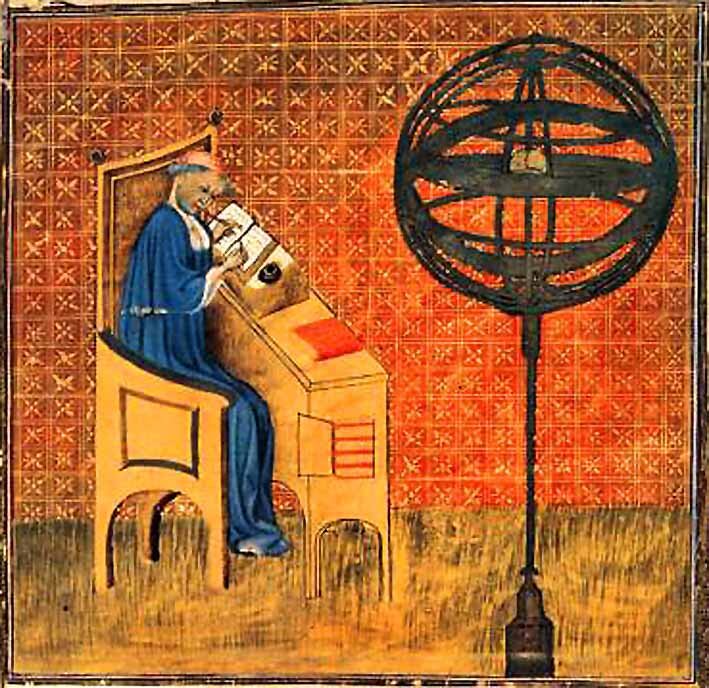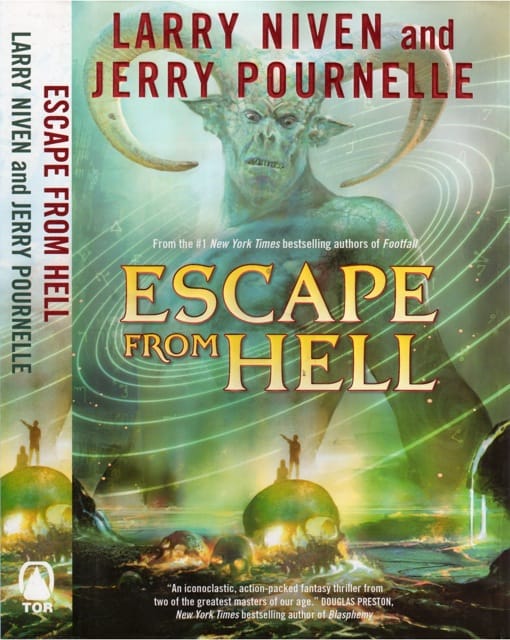The Long View 2007-11-04: President Emeritus; The Closing of the American Mind; The Decay of Atheism; Barzun Forever

Oresme
Public Domain, https://commons.wikimedia.org/w/index.php?curid=436922
Great books or a classical canon is very much an Anglosphere kind of thing. John J. Reilly was more interested in the canon which comprises the Old and New Testaments than in anything that came out of the University of Chicago.
The creation of a classical canon is mostly a question of editing. It's not supposed to be comprehensive. The objection to a canon, in fact, is that it may broaden the mind while cramping the imagination.
He also offers us this remark on the Renaissance in passing:
We should remember that the Renaissance did not look on itself as a time that had thrown off the burden of the past, but that had reclaimed the past. That has happened time and again in history, and no doubt it will recur. It is not too soon to recall, though, that every renascence badly misconstrues the part it rediscovers.
The Renaissance was exciting in part because classical texts unknown to the medievals came to light, for example Plato’s dialogues. Regrettably, the Renaissance was also a time of violence and disease, so not much actually came out of the Renaissance other than art.
President Emeritus; The Closing of the American Mind; The Decay of Atheism; Barzun Forever
I have long had doubts about the inevitability of the ascension of Hillary Clinton to the presidency, or even to nomination by the Democratic Party, but I am not about to discuss the likelihood of that prospect or its merits now. What I would like to mention is this comment by Charles Krauthammer, which I think expresses perfectly what would be novel about La Clinton in the Oval Office:
Forget about Bill, the bad boy. The problem is William Jefferson Clinton, former president of the United States, commander in chief of the Armed Forces, George Washington's representative on earth. ...Any ex-president is a presence in his own right. His stature, unlike, say, Hillary's during Bill's presidency, is independent of his spouse. ...Only one solution comes to mind. Argentine-U.S. relations are quite rocky these days. The posting of a charming and dynamic ex-president to the Kirchner court in Buenos Aires might do those relations a world of good. The Romans had a fine appreciation for the art of exile. This might be an excellent occasion for us to start cultivating it.
There is a popular belief, not quite a rumor, that the plan has always been for the Clintons to return with Hillary in the White House and Bill in the Secretary General's office at the UN. It is hard to see how that could happen, but it would have been hard to see in 1999 how Hillary might become the leading candidate for the Democratic nomination eight years later. Be that as it may, however, there are practical issues in connection with an ex-president becoming a presidential spouse. Does an ex-president outrank a vice president for protocol purposes, for instance? Who would have to go to the funerals of middle-rank heads of state?
* * *
Among the epoch-making books I have not read, surely Alan Bloom's The Closing of the American Mind must rank in the first hundred or so. Nonetheless, I note with interest these remarks by Mark Steyn on the 20th anniversary of its publication:
A classical education considers society as a kind of iceberg, and teaches you the seven-eighths below the surface. Today, we live on the top eighth bobbing around in the flotsam and jetsam of the here and now.
I am not altogether sure of that. The creation of a classical canon is mostly a question of editing. It's not supposed to be comprehensive. The objection to a canon, in fact, is that it may broaden the mind while cramping the imagination. Nonetheless, Steyn has a point here:
Popular culture used to be very at ease with the inheritance of the past. One of the trends of the last forty years is not just the vanishing of “high culture” but of low- culture jokes about high culture—the variety-show sketches in which Schubert’s mates urge him to come down the pub with him and he says “No, I’ve got to stay in and finish my symphony.” It assumes a residual familiarity—from some half-recalled school lesson—with a bloke called Schubert who wrote an “Unfinished Symphony.”..[T]he loss of a high-culture aesthetic eventually undermines your pop culture, too. Imagine if talking pictures hadn’t been invented in 1927, but eighty years later, in 2007. Do you think Hollywood studios today would conclude that they needed to hire house composers and full orchestras to accompany the drama with symphonic scores? Something we take for granted about the form of modern talking pictures—dialogue accompanied by orchestral music—arose from a particular kind of cultural aspiration that no longer exists.
We should remember that the Renaissance did not look on itself as a time that had thrown off the burden of the past, but that had reclaimed the past. That has happened time and again in history, and no doubt it will recur. It is not too soon to recall, though, that every renascence badly misconstrues the part it rediscovers.
* * *
My non-reading is encyclopedic: it also includes the recent neo-atheist literature. The book I would like to read is Christopher Hitchens's God Is Not Great, since ordinarily I have a great deal of time for Hitchens, but by most accounts the smartest one is Daniel Dennett's Breaking the Spell. However, little about the controversy is very enticing. Consider this letter to The New York Review of Books by Dennett, in which he comes to the defense of a less perspicacious colleague:
[Re: H. Allen Orr, in "A Mission to Convert" [NYR, January 11], his review of Richard Dawkins's The God Delusion and other recent books on science and religion]...I myself have looked over large piles of recent religious thought in the last few years in the course of researching my own book on these topics, and I have found almost all of it to be so dreadful that ignoring it entirely seemed both the most charitable and most constructive policy. (I devote a scant six pages of Breaking the Spell to the arguments for and against the existence of God, while Dawkins devotes roughly a hundred, laying out the standard arguments with admirable clarity and fairness, and skewering them efficiently.) There are indeed recherché versions of these traditional arguments that perhaps have not yet been exhaustively eviscerated by scholars, but Dawkins ignores them (as do I) and says why: his book is a consciousness-raiser aimed at the general religious public, not an attempt to contribute to the academic microdiscipline of philosophical theology....there are plenty of people like Orr who still want to protect religion from the sort of unflinching scrutiny Dawkins and I (and Sam Harris and Louis Wolpert and others) are calling for.
But the whole neo-atheist episode seems to be a flinch. There is a venerable tradition of skeptical and anti-theist writing; it boasts names like Hume and Feuerbach and Nietzsche and Bertrand Russell. Whether or not you like what these people had to say, their thought reached the height of their times. The problem with the current atheist campaign, at least from the shorter examples by both sides I have read, is that it is no better than the religious junk-literature it conceives to be its enemy. There is quite a lot of religious junk, of course: some of the alleged science the Discovery Institute puts out would embarrass the American Tobacco Institute. Nonetheless, this iteration of the Great Debate seems marked by a novel inability of the Non Serviam League to grapple with or even understand the dispositive issues. That is largely the fault of Neo-Darwinism, a doctrine that did not disable the thought processes of earlier unbelievers; little of what today's atheists have to say sounds much like Huxley, for instance
This is precisely the kind of cultural declension that Steyn was talking about. To compare Voltaire's skepticism to that of, say, Dawson's (with whose writing in this area I am somewhat familiar) is like comparing the 1963 version of The Haunting with the appalling 1999 version. The first was arguably the best ghost story ever filmed: it was all understated psychology and sexual tension, with almost no special effects. The later film fleshed out a serial-killer backstory with onscreen decapitations and a digitally-generated ghost the size of a tyrannosaurus rex. The former was emotionally persuasive; the latter was not.
* * *
The notion of a future renascence mentioned above, by the way, comes from Jacques Barzun's From Dawn to Decadence. I was therefore happy to learn from Leo Wong that the author is still with us to celebrate his centenary: you can find some background here. Also, one of Barzun's former students, Jeffrey Hart, explains here why Barzun is important.
Copyright © 2007 by John J. Reilly
Support the Long View re-posting project by downloading Brave browser, and then trying it out. With Both Hands is a verified Brave publisher, you can leave me a tip too!



Comments ()